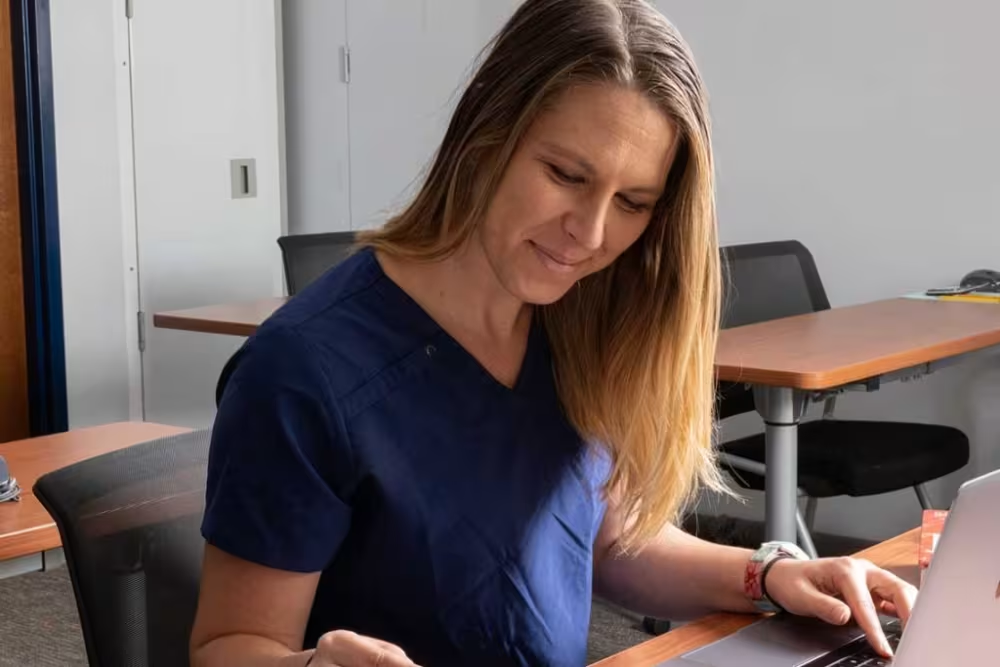How to Become a Pediatric Nurse: A Step-by-Step Guide
Each blog post is dated and contains accurate information as of that date. Certain information may have changed since the blog post publication date. If you would like to confirm the current accuracy of blog information, please visit our ABSN overview page or contact admissions at (866) 483-8705.
Pediatric nurses work with children and adolescents throughout their development, providing an invaluable service in healthcare. If you’re wondering how to become a pediatric nurse, you can do so by earning a nursing degree and attaining licensure. Optional certifications can also help boost your career.

The future depends on the health and well-being of the next generation, which starts with providing the best possible care for children. Pediatric nurses play a crucial role in healthcare by caring for infants, children, and adolescents, ensuring they receive the medical attention they need at each stage of their development.
If you are interested in making a difference in the lives of young patients, understanding how to become a pediatric nurse is the first step. This career requires specialized education and training, which includes pediatric nurse schooling to prepare aspiring nurses to meet the needs of children.
Averett University’s Accelerated Bachelor of Science in Nursing (ABSN) program offers a quicker route into the nursing field, helping you launch your career in less time while gaining the essential skills to make a difference in children’s lives. In as few as 16 months, you could graduate with a bachelor’s degree and be ready to enter this area of nursing practice.
Discover what a pediatric nurse does, the steps to becoming one, and how Averett’s ABSN program in Virginia can help you achieve your education goal.
What Does a Pediatric Nurse Do?
Pediatric nurses serve as children’s voices in healthcare. These registered nurses (RNs) specialize in treating young patients who are still learning how to sit still for more than five minutes.
Daily duties include providing care for children from infancy through their teen years, administering medication, preparing for diagnostic tests, monitoring patient’s conditions and communicating with families about their child’s health. Pediatric nurse schooling helps prepare individuals to learn the ins and outs of the job before stepping into it.

Pediatrics nurses make sure their young patients are heard. See the ways nurses act as patient advocates.
Steps to Become a Peds Nurse
Like any career, there are different pathways to receive the training to perform the job well. For pediatric nurses, it takes a combination of education and hands-on experience. Let’s examine how to become a pediatric nurse.
1. Get an Undergraduate Degree
Aspiring pediatric nurses need to pursue higher education by earning either an associate or bachelor’s degree in nursing. These programs provide the essential foundation for understanding the core concepts of nursing.
Even if your bachelor’s degree is not in nursing, it is not too late to become a pediatric nurse. Accelerated nursing programs allow individuals with a non-nursing bachelor’s degree to pursue a career in nursing.

Averett’s ABSN program is a great example, delivering a curriculum that allows students to start their nursing career in as few as 16 months while still covering all the necessary knowledge and skills. As an Averett ABSN student, you will learn through:
- Online-based coursework with interactive modules and responsive instructor support.
- In-person skills and simulation labs allowing you to apply your knowledge and hone your skills in a safe, mock clinical environment.
- Clinical rotations delivering hands-on patient care at top area healthcare facilities.
Once you have completed your degree, you will be ready to sit for the licensing exam.
2. Pass the National Council Licensure Examination
Just like lawyers must pass the LSAT and doctors the MCAT, all nurses must pass the NCLEX. You must complete a nursing program to be eligible for the exam. Averett University ABSN provides study materials and practice sessions prior to taking the NCLEX, as part of our track record of student support. This exam confirms your competency and knowledge in nursing, proving you are ready to work as a registered nurse.
See 10 key NCLEX study tips to set you up for success.

3. Become a Registered Nurse
After passing the NCLEX, you will meet the state board of nursing’s requirements for licensure and be officially qualified to start working as a registered nurse. At this stage, you can work to secure jobs that offer experience in pediatrics. This will help you learn how to care for and interact with children effectively. The social aspect of pediatric nursing is just as important as the medical side.
4. Earn Optional Certifications
While additional certification is not required, it is strongly recommended. The certification reinforces your expertise and enhances your appeal to employers. There are three main organizations offering pediatric nursing certifications:
- Pediatric Nursing Board Certification
- National Certification Corporation
- American Nurses Credentialing Center
PNCB is considered the leader in this area. If you’re a fan of multiple-choice exams, you’ll be pleased to know that theirs consists of 175 questions, and you’ll have three hours to complete it.

How Long Does It Take to Become a Pediatric Nurse?
While five steps might not seem too lengthy, each one does take time. An associate degree typically takes two to three years to complete, while a traditional bachelor’s degree usually takes four years.
ABSN programs, like the one at Averett University, can be completed in a little over a year for students who meet qualifications, such as a prior bachelor’s degree or at least 60 non-nursing college credits. The time it takes to pass the NCLEX and become a licensed RN varies by individual, so there’s no exact timeline for everyone.
Essential Skills and Competencies for Pediatric Nurses
Pediatric nurses need to have strong medical knowledge, but they also must master the art of communicating with children, which remains a mystery to some. Some key skills and traits that make a great pediatric nurse include:
- Sensitivity
- Empathy
- Emotional intelligence
- Responsible
- Compassionate
- Reliable
- Understanding
- Strong communication
- Ethics
- Relationship building
- Handling difficult situations
- Collaboration and teamwork
- Cultural awareness
These essential traits and skills allow pediatric nurses to provide not only expert care but also comfort and support, ensuring a sense of trust and security for both children and their families.
Career Opportunities and Advancements for Peds Nursing
While some jobs are losing their value due to technological advancements, nursing remains a high-demand field because there will always be a need for nurses. According to the U.S. Bureau of Labor Statistics, the number of jobs for registered nurses is expected to grow 6% from 2023 to 2033, faster than average for most careers.
With the aging population, nurses with specialized expertise will stay booked and busy. Not only will there be no shortage of jobs, but the pay is competitive. In May 2023, the BLS reported that registered nurses’ median annual wage was $86,070.

Pursue a Career in Pediatric Nursing with Averett ABSN
Making a doctor’s visit as positive and exciting as possible can have a lasting impact on children’s lives, and pediatric nurses play a key role in shaping that experience. While pediatric nurse schooling is challenging, the job security, pay and meaningful work make it worthwhile.
It is never too late to answer your calling as a pediatric nurse. Averett’s ABSN program can help you start your journey. We offer three start dates per year in January, May and August at our Norfolk, Virginia ABSN learning center, and our small class sizes enable plenty of personalized attention and support from instructors and advisors alike.
Contact us today to begin the conversation with an admissions advisor.
